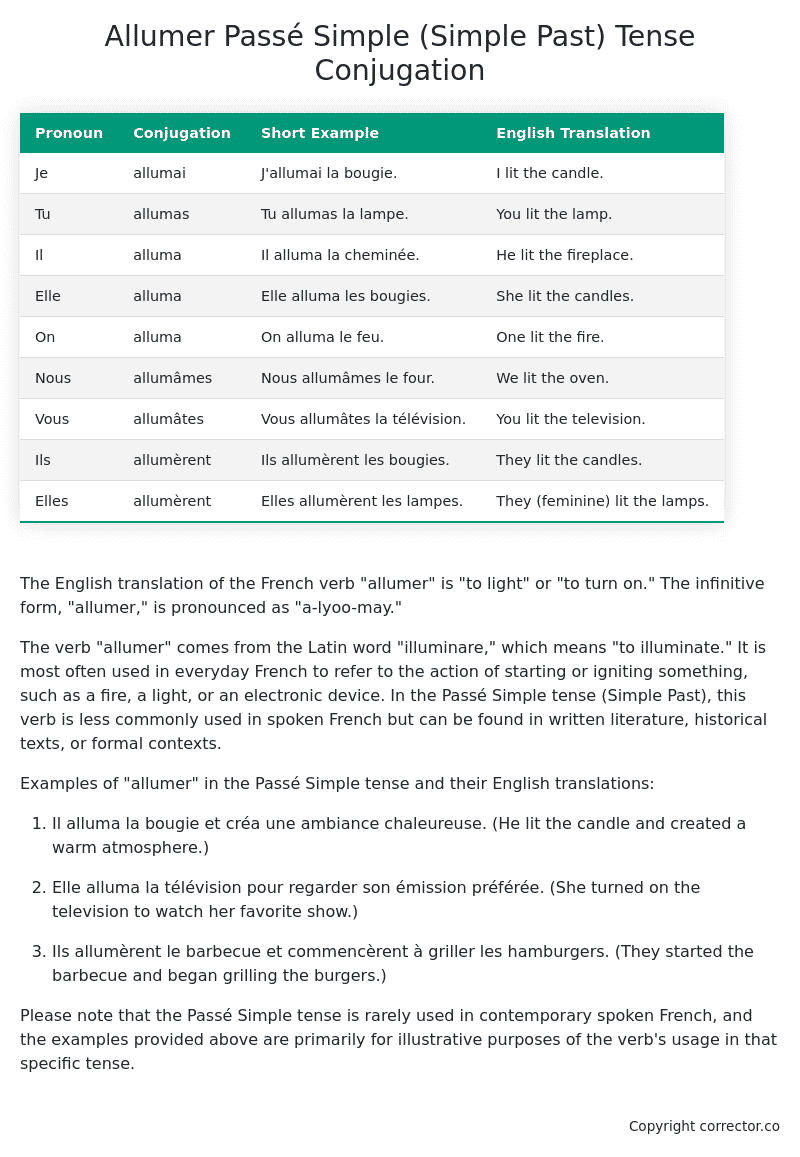Passé Simple (Simple Past) Tense Conjugation of the French Verb allumer
Introduction to the verb allumer
The English translation of the French verb “allumer” is “to light” or “to turn on.” The infinitive form, “allumer,” is pronounced as “a-lyoo-may.”
The verb “allumer” comes from the Latin word “illuminare,” which means “to illuminate.” It is most often used in everyday French to refer to the action of starting or igniting something, such as a fire, a light, or an electronic device. In the Passé Simple tense (Simple Past), this verb is less commonly used in spoken French but can be found in written literature, historical texts, or formal contexts.
Examples of “allumer” in the Passé Simple tense and their English translations:
-
Il alluma la bougie et créa une ambiance chaleureuse.
(He lit the candle and created a warm atmosphere.) -
Elle alluma la télévision pour regarder son émission préférée.
(She turned on the television to watch her favorite show.) -
Ils allumèrent le barbecue et commencèrent à griller les hamburgers.
(They started the barbecue and began grilling the burgers.)
Please note that the Passé Simple tense is rarely used in contemporary spoken French, and the examples provided above are primarily for illustrative purposes of the verb’s usage in that specific tense.
Table of the Passé Simple (Simple Past) Tense Conjugation of allumer
| Pronoun | Conjugation | Short Example | English Translation |
|---|---|---|---|
| Je | allumai | J’allumai la bougie. | I lit the candle. |
| Tu | allumas | Tu allumas la lampe. | You lit the lamp. |
| Il | alluma | Il alluma la cheminée. | He lit the fireplace. |
| Elle | alluma | Elle alluma les bougies. | She lit the candles. |
| On | alluma | On alluma le feu. | One lit the fire. |
| Nous | allumâmes | Nous allumâmes le four. | We lit the oven. |
| Vous | allumâtes | Vous allumâtes la télévision. | You lit the television. |
| Ils | allumèrent | Ils allumèrent les bougies. | They lit the candles. |
| Elles | allumèrent | Elles allumèrent les lampes. | They (feminine) lit the lamps. |
Other Conjugations for Allumer.
Le Present (Present Tense) Conjugation of the French Verb allumer
Imparfait (Imperfect) Tense Conjugation of the French Verb allumer
Passé Simple (Simple Past) Tense Conjugation of the French Verb allumer (You’re reading it right now!)
Passé Composé (Present Perfect) Tense Conjugation of the French Verb allumer
Futur Simple (Simple Future) Tense Conjugation of the French Verb allumer
Futur Proche (Near Future) Tense Conjugation of the French Verb allumer
Plus-que-parfait (Pluperfect) Tense Conjugation of the French Verb allumer
Passé Antérieur (Past Anterior) Tense Conjugation of the French Verb allumer
Futur Antérieur (Future Anterior) Tense Conjugation of the French Verb allumer
Subjonctif Présent (Subjunctive Present) Tense Conjugation of the French Verb allumer
Subjonctif Passé (Subjunctive Past) Tense Conjugation of the French Verb allumer
Subjonctif Imparfait (Subjunctive Imperfect) Tense Conjugation of the French Verb allumer
Subjonctif Plus-que-parfait (Subjunctive Pluperfect) Tense Conjugation of the French Verb allumer
Conditionnel Présent (Conditional Present) Tense Conjugation of the French Verb allumer
Conditionnel Passé (Conditional Past) Tense Conjugation of the French Verb allumer
Conditionnel Passé II (Conditional Past II) Tense Conjugation of the French Verb allumer
L’impératif Présent (Imperative Present) Tense Conjugation of the French Verb allumer
L’impératif Passé (Imperative Past) Tense Conjugation of the French Verb allumer
L’infinitif Présent (Infinitive Present) Tense Conjugation of the French Verb allumer
L’infinitif Passé (Infinitive Past) Tense Conjugation of the French Verb allumer
Le Participe Présent (Present Participle) Tense Conjugation of the French Verb allumer
Le Participe Passé (Past Participle) Tense Conjugation of the French Verb allumer
Struggling with French verbs or the language in general? Why not use our free French Grammar Checker – no registration required!
Get a FREE Download Study Sheet of this Conjugation 🔥
Simply right click the image below, click “save image” and get your free reference for the allumer Passé Simple tense conjugation!

Allumer – About the French Passé Simple (Simple Past) Tense
Formation
Usage
Narration
Historical Context
Interactions with other tenses
Passé Composé
Imparfait
Conditional and Subjunctive
Summary
I hope you enjoyed this article on the verb allumer. Still in a learning mood? Check out another TOTALLY random French verb conjugation!


